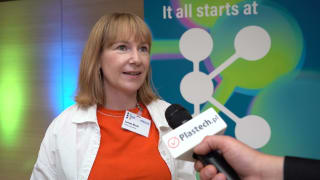Any reduction in the amount of material used for the company’s PET bottles must not be allowed to have a detrimental impact on their stability, however. On the small-format bottles for juice and tea, whose weight has been cut from 22 to 20 grams, this is mainly prevented by nitrogen being injected into the head space, thus increasing the interior pressure in the container until it’s first opened. The six feet on the bottle base provide added rigidity and sturdiness.
Cutting-edge stretch blow molding technology
Further resources are saved with the help of KHS’ latest generation stretch blow molding technology. The focus heater on the near infrared or NIR heating system allows optimum use of the material directly below the preform neck ring for the bottle walls and is largely instrumental in helping to cut down on weight. While the stretch blow molds are heated to a high of 120°C, the neck ring and base are water-cooled down to 10 to 15°C. This adapts the properties of the container in such a way that filling at a beverage temperature of up to 85°C takes place with just a minimum of shrinkage.
The specific location of the production site meant that the bottles used for hot filling merited special attention and were subjected to an extensive validation process. Postobón’s products are filled in Colombia’s capital at an elevation of 2,600 meters and thus need to withstand particularly high internal pressures. This is because bottles from Bogotá are also supplied to the Colombian coast down at sea level; once unloaded, there still needs to be enough positive pressure in the containers to prevent them from deforming. “In Bogotá, for example, the boiling point of water drops to 92°C because of the extreme elevation,” explains Fernando Delgado, regional sales manager at KHS Andes. The bottle design thus needs to account for these physical challenges.
In addition to containers for hot filling with nitrogen, the experts at KHS also developed a classic hot-fill bottle with panels. The new Gatorade bottle for licensor PepsiCo has a flat base and vertical grooves that give it perfect stability without nitrogen having to be used during filling. Its weight has also been decreased from 26 to 24 grams.
“All of the KPIs we defined regarding cost, quality, efficiency and productivity have been kept to,” says Bohórquez happily and goes on to empha just how important the new system is. “With the new HotFill+ line from KHS we can boost our production of juice, tea and energy drinks by up to 54%. This gives us an increase in our total output of around 5%,” he smiles.
Solutions to meet all challenges
The third KHS line covers a further segment, processing not just water but also carbonated soft drinks. The line is built around an InnoPET TriBlock featuring a KHS roll-fed station for hot-melt wrap-around labeling, also for a maximum of 54,000 bottles an hour. Formats range from 300, 400 and 600 millimeters through 1.0 and 1.5 liters to the 2.5-liter container that’s very popular in Colombia.
“Each of our projects presents us with unique challenges,” Bohórquez sums up, looking back on the three new lines commissioned very quickly one after another. “In order to meet these, together with KHS we repeatedly look for and find solutions and synergies that take us a good step further towards reaching our ambitious strategic growth targets.”
The most recent project to come out of the two companies’ technological partnership is a new KHS InnoPET Blomax V stretch blow molder. Integrated into an existing PET line by Postobón’s own converter Iberplast at the Caloto bottling plant, with its 20 cavities it can produce up to 45,000 bottles per hour in s ranging from 500 milliliters to one liter. On the line the containers are filled with beverages such as juice, tea and energy drinks at temperatures of up to 85°C.
Innovation and expertise
“Postobón always wants to keep its equipment state of the art - especially with respect to using as little energy and as few energy resources as possible in order to reduce the impact on the environment,” says Delgado. In KHS the customer benefits from continuous innovation and in-depth expertise regarding hot filling, for example. This is a success factor that provides a solid basis for a genuine relationship of trust, he believes. “On the one hand, our recipe for success entails nurturing close relations by correctly anticipating the issues and questions a customer may have. On the other, we form a perfectly coordinated team made up of KHS colleagues situated both locally and at our headquarters in Germany. This is something a customer like Postobón is of course happy to profit from.”



